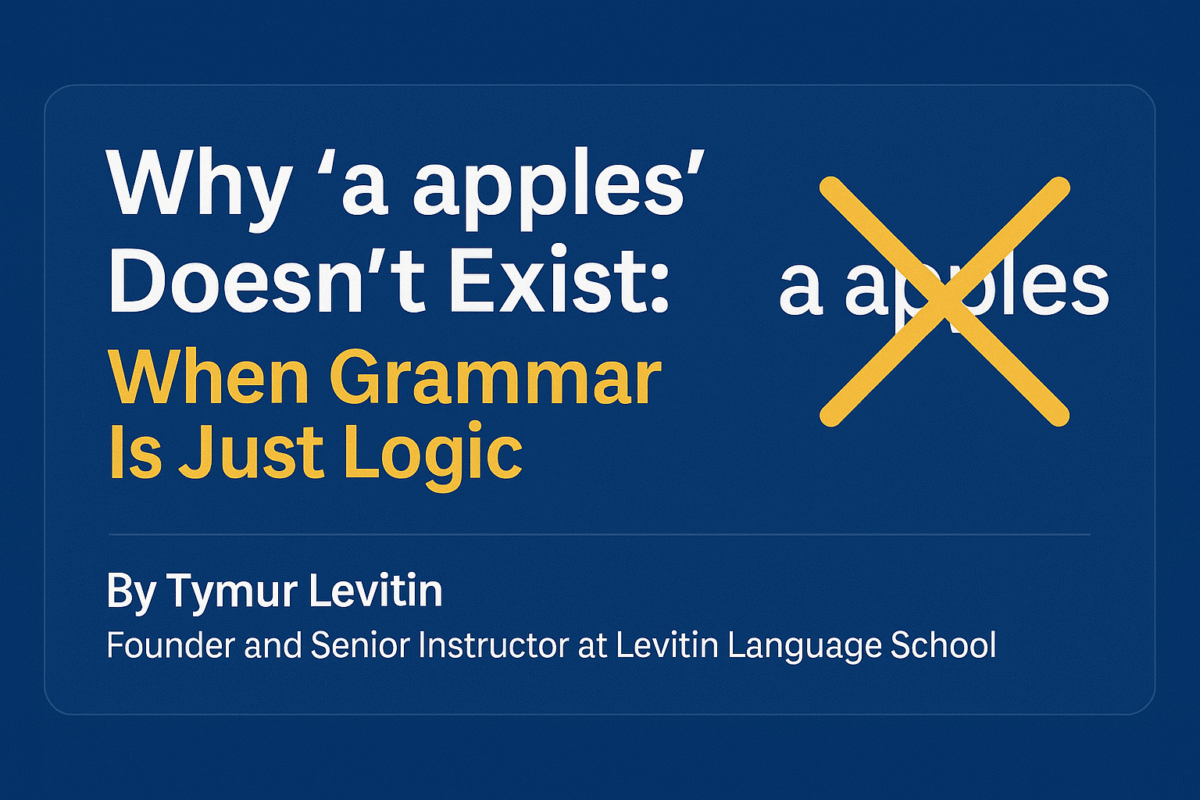En Escuela de idiomas Levitin, we don’t ask students to memorize rules. We ask them to understand why the rules make sense — and that changes everything.
Let’s start with a simple question:
Why is “a apples” wrong?
You could say, “Because ‘a’ is used before consonant sounds and ‘an’ before vowel sounds.”
And you’d be right. But that’s not the point.
The real question is:
Why would the language even need to make that distinction?
Grammar as Optimization
Spoken language developed before grammar books.
People chose what sounded clear and natural — what helped listeners instantly grasp what was being said.
Try to say:
“I ate a apple.”
It clashes — like you tripped on a rock mid-sentence. The vowel sounds collide. So people began saying:
“I ate an apple.”
Not because of a grammar rule — but because it just flowed better.
The rule came later. The lógica was first.
Why Native Speakers Don’t Think in Rules
If you ask a native speaker to explain why “a apples” is wrong, most won’t quote grammar rules. They’ll just say:
“It sounds wrong.”
“You can’t say that.”
“It just doesn’t work.”
They’re not being unhelpful — they’re being honest.
They don’t calculate rules — they feel patterns.
That’s exactly how we teach.
But What If There’s a Twist?
Let’s say you hear this sentence:
“A hundred apples were sold.”
Now “a” before a word that starts with a vowel — and it sounds right. Why?
Because “a hundred” is a unit, a countable block, and “hundred” starts with a consonant sound.
This is where logic wins over memorization.
When students learn grammar like a puzzle — not like a punishment — they begin to comprender the language, not fear it.
Mistakes Are Clues
When a student says “a apples,” they’re not lazy or bad at grammar.
They’re simply using a pattern from their native language or misapplying logic.
That’s a gift.
It gives us a window into how they think — and a chance to build a stronger foundation.
Trusting the Inner Filter
We train our students to develop a mental filter — not a list of rules.
After enough meaningful examples, the brain starts rejecting incorrect forms on its own.
You don’t need to remember that “goed” is wrong.
You feel that “went” is right.
You don’t need to look up when to say “an.”
You just say it — because it sounds right.
That’s the level we aim for.
From Rules to Reason
At the end of the day, language isn’t math — but it has logic.
You don’t need to memorize 150 exceptions.
You need to understand why those “exceptions” exist in the first place.
That’s why “a apples” isn’t just wrong — it’s a doorway into how language really works.
Related posts from our blog:
- El cambio de tiempo en la traducción: Por qué el tiempo siempre importa
- What If I Had Known?
- Learn English Online
Habla con libertad. Aprende con inteligencia.
By Tymur Levitin, Founder and Senior Instructor at Levitin Language School.
🔗 Conoce al autor →
© Tymur Levitin. Todos los derechos reservados.
























